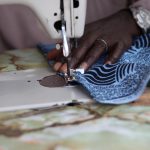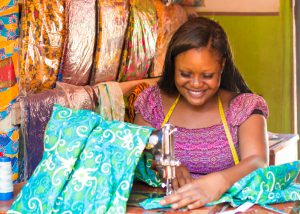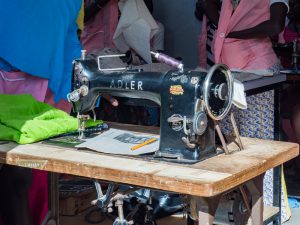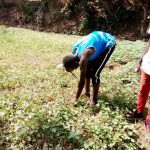Vocational training
Hakeem Schools caters for the very poor in the community, with many adults in our demographic
earning $2 a day, or having no paid work. As the country provides no affo

rdable structural vocational education, we have set up three vocational programs for free to our community. To empower and up-skill low-income adults, many of whom are not literate, we offer the parents of students access to these training programs. In vocational training, we offer:
Become a tailor
Farming produce
Baking for business
We would like to thank our very skilled professional trainers who give us their time and expertise to help up-skill our school community. Proceeds from sales from our training classes go back into helping fund the school’s operations.
◊
Become a Tailor
This program helps people to develop the skills to set up their own small business as a tailor. Running for just on three years, the program currently has 12 adult participants, including both men and women. It is proving successful.
Three professional tailors working bring their skills to class, covering designing, sewing and finishing clothes based on African styles and themes. They work on a volunteer basis.
We have so far three sewing machines on site.
Sewing skills in demand
There is demand in the broader community for tailors, and already our tailors-in-training have orders coming in from our community to create clothing for events and do repairs.

Sierra Leone does not have a manufacturing industry, rather tailors operate from corner shops.
Participants learn to design and sew clothes appropriate for local wear. Working often with cotton is popular.
More on the project
One Hakeem founder, Sarjoh Bah says: “Our teachers are very talented members of their trade, sewing professionally is what they have done all their lives.”
“They come and teach people, who may have little skill in the written language. It is a very practical approach.”
Sarjoh says there will be a line of clothing designed through this program for the office that is based on African traditional clothes.

Building community through sewing
“We aim to make changes to the country, by working on the community level. People involved in these programs will become empowered by starting their own businesses, and be able to better pay their school fees for their children.”
At present 60% of the children who attend Hakeem Schools have their fees subsidised.
“Ours is a poor area, normally the children here wouldn’t have access to school.”
Our Farming Produce
What better way to get back to nature, while learning farming skills for

sustainable living and business, than through our Farming Produce project. This project helps participants learn and practice farming skills, as well as marketing their homegrown produce. Participants train under the guidance of four farming professionals. Our farmers in training are now growing potatoes, cassava, mango, oranges and other basic foods. The cassava leaves grown in this project are already in high demand.
Hakeem Schools Extends to Makolo
Our Farming Project takes place on a two-acre block of flat, fertile land in an area called Makolo. This area has been without a school at primary and secondary level for its local children, so we are in the process of building another school premises there, thus extending our school community to meet the needs of Makolo. Over the long term we hope to create a thriving agricultural community in this district.
Farming for sustainability
We aim to grow fruit and vegetables for everyday use, as well as those in demand in the broader community so we can sell them on the market and earn money for self-sustenance. This program not only helps participants build professional farming and small business skills, it helps them connect to nature.
Two years of success
Running successfully for two years, we make sure as well as adult participants, we take on young people. The work is carried out using shovels and other manual tools, which is typically the case in Sierra Leone.
We presently have five families working the land, which amounts to 12 people.
Our aim is to encourage people to work the land and become more self-sufficient. If you work the land, it will help you sustain your community, finding ways not to rely on outside sources such as imported goods. As imported products can be expensive, this is also a cost-cutting approach. We began this program based on demand. When we went in search of land, we discovered that the land in Mokolo was fertile, and with a lack of employment opportunities, it was a neighbourhood where many people didn’t have much to do.